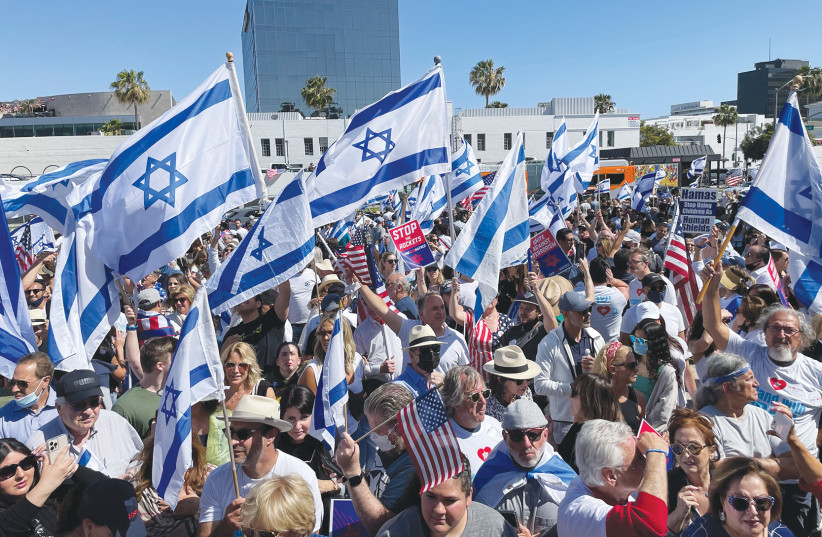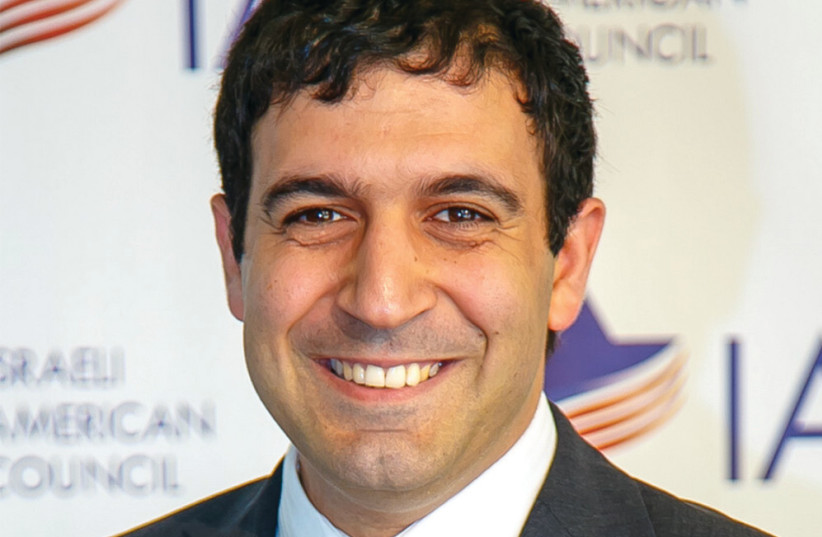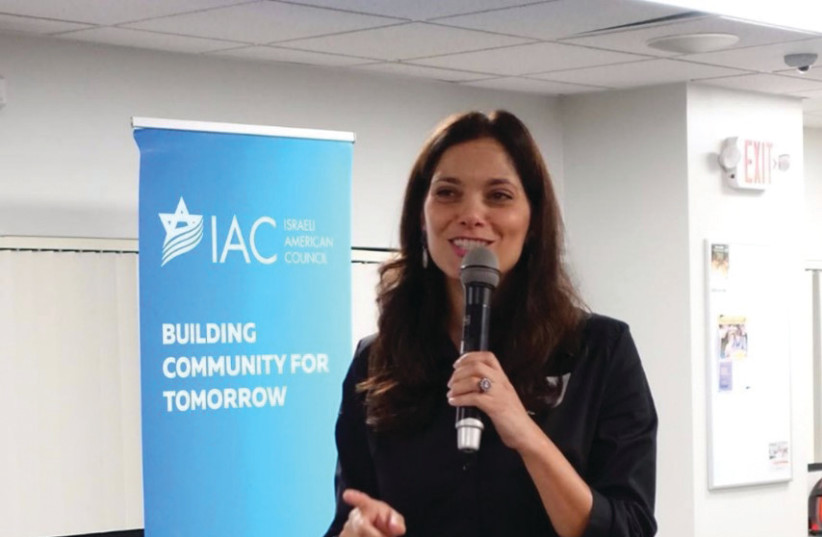by Noa Amouyal
Through grassroots efforts, IAC reaches out to community lay leaders so those who support Israel can have a safe space in the classroom, boardroom and beyond.
 |
Pro-Israel advocates gather in Los Angeles at an
IAC-organized rally in May which was part of the organization’s
nationwide campaign supporting Israel.
(photo credit: IAC) |
 |
| Shoham Nicolet (credit: IAC) |
As a mother of twins in middle school, Israeli-American Council (IAC)
Boston regional director Lital Carmel was dismayed but not surprised
when one of their peers approached them and told them about perceived
atrocities the IDF allegedly committed against the Palestinians.
Armed
by their mother with the knowledge to counter such remarks, the twins
responded by describing how Israel acts in self-defense and its
civilians are often targets of rockets fired from Gaza.
“You’re feeding off biased information,” the tween answered back.
“And you are, too,” the twins responded.
 Lital Carmel (credit: IAC)
Lital Carmel (credit: IAC)While
it might seem shocking to hear of fifth graders delving into
geopolitical debates during recess, these kinds of encounters are all
too common, and the average age when these conversations occur is
decreasing.
“This
is our new reality,” Carmel said. “Kids growing up in Israel get this
education, but when you live in America, if the parents don’t take the
time to really do the work and go through the process, then their kids
will get information from other sources that they don’t have control
over.”
As a
nonpartisan pro-Israel organization, IAC strives to provide
Israeli-Americans and Jewish-Americans with tools so that when they find
themselves in the midst of such a dialogue, they can speak openly and
confidently.
Through grassroots efforts, IAC reaches out
to community lay leaders so those who support Israel can have a safe
space in the classroom, boardroom and beyond.
That
message of unification has become all too relevant these days in the
wake of increasing antisemitism in the United States. Just last month,
the FBI revealed that 57.5% of religious-based hate crimes are targeted
toward Jews. But one does not need to look to statistics to see the cold
hard truth that was laid bare during Israel’s most recent operation in Gaza.
From anti-Israel protests to thugs physically attacking Jews on the streets of New York, LA and Boston, anti-Jewish sentiment felt like the rule and not the exception.
IAC is seeing the ramifications of this development on an individual level within certain communities.
“I
think what we’ve been seeing in the last two years is a normalization
of antisemitism. We were used to seeing it on the radical Right and
Left, and suddenly, especially in the past two years, we’ve been seeing
more in the mainstream,” Nicolet said.
“In
the context of what’s going on, we see more parents moving their kids
from private schools to public ones. Jews are feeling less secure on a
physical level. I just spoke to teenagers asking them how they feel, and
they said it was the first time they felt their non-Jewish friends have
been hostile to them,” he added.
This
shift is especially jarring for IAC members who are Israeli and are
used to living as a majority and not a protected minority.
IAC
helps them bridge this gap through a variety of programs and
behind-the-scenes activism work. An example of its programming is School
Watch and Connectivism, which address anti-Jewish and anti-Zionist
sentiment. Connectivism is an interactive study session series where
teens and adults can learn how to become pro-Israel activists through
understanding the Boycott, Divestment and Sanctions movement, biased
teaching about Israel in US curricula, and creating an Israel-positive
space on college campuses.
Meanwhile,
School Watch gives parents and kids a platform to file a complaint if
they experience something they deem to be antisemitic in classrooms.
But,
of course, there’s a fine line between what’s hateful and what’s
ignorant, and Carmel – who helped launch both initiatives – is
well-aware of the tightrope IAC must walk when advocating for their
participants.
“We actually come across this dilemma on a weekly basis,” she said. “I would say there’s a very fine line.
“For
example, we had a school where a student wrote an essay about the
legitimacy of a Palestinian state, and the parents felt uncomfortable
with that.
“We
said, ‘Listen, this is exactly what schools are for. This is freedom of
speech. So let’s give your kid the tools to form their own opinion about
what was brought to them.’
“There’s
a very fine line between the kids and the teachers. So if a teacher
writes on the board, ‘End colonization – Free Palestine,’ then this is
not okay. If a kid writes it, we address it differently.”
WHILE
THESE initiatives are effective on a person-to-person level, IAC also
operates on a larger scale and utilizes extensive partnerships to do
so.
Along with dozens of New York area Jewish community organizations, IAC held a massive rally
at Ground Zero in May, in light of the wave of antisemitic attacks. The
rally was followed by similar events in major cities across the
country.
Ground Zero, a sacred spot for any New Yorker, was chosen as it is a reminder of when America was directly threatened.
“I
think that the choice to do it in a location where the nation’s freedom
was under attack was a proper decision,” Nicolet asserted. “The World
Trade Center site is a powerful symbol of America’s resilience and
resolve against hatred and terrorism, just as the people of Israel stand
strong in the face of terrorism and hate,” said Nicolet.
Carmel
encourages the community to learn from the success of that rally and
how working together is the path toward not only surviving in the
Diaspora but thriving.
Yom Kippur this year happens to fall only a few days after the 20th anniversary of 9/11.
“As
a community, we need to take this time to think about how we can create
more partnerships and coalitions so we speak with one voice, a voice
that’s unapologetic and proud of our Jewish heritage and the Jewish
state – however imperfect it is,” she said. “Yom Kippur is a very
personal day and we all think about it differently. [But I encourage
people to understand that] the challenges are much bigger and will only
get bigger.”
“Antisemites
were always here. They were here when they said they wanted to send us
to the ovens, and they’re here now drawing swastikas on synagogues. Now
[antisemitism] is greater maybe because of social media, but we should
be focused on finding the right solutions and understanding that the IAC
can’t do it alone,” Nicolet added. “Let’s focus on fighting them
instead of fighting each other.”
Noa Amouyal
Source: https://www.jpost.com/diaspora/for-americans-fighting-for-israel-is-an-uphill-battle-679530
No comments:
Post a Comment